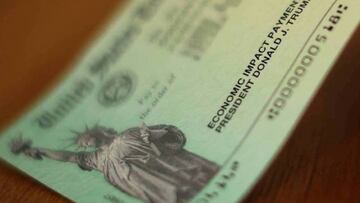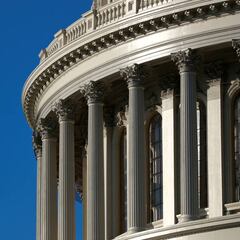Second stimulus check: how much would bipartisan relief proposal get you?
The Problem Solvers Caucus, a bipartisan group of US lawmakers, on Tuesday unveiled a coronavirus relief proposal called the "March to Common Ground".

A bipartisan group of 50 United States lawmakers on Tuesday unveiled a new proposal for a coronavirus aid package, which includes a second - and possibly third - round of stimulus checks for qualifying Americans.
Bipartisan proposal seeks to "help break the gridlock on the latest Covid-19 relief"
Led by Representatives Josh Gottheimer (D-NJ) and Tom Reed (R-NY), the Problem Solvers Caucus - which is made up of 25 Democrats and 25 Republicans - said the release of their "framework" plan was an attempt to “help break the gridlock on the latest Covid-19 relief package and encourage negotiators to get back to the table”.
Talks between Democratic congressional leaders and White House chiefs have so far failed to yield an agreement over a fifth coronavirus relief bill, with the two sides well apart in their desired overall spend.
Democratic negotiators Nancy Pelosi and Chuck Schumer say they are willing to reduce the $3.4m outlay set out in the HEROES Act - a relief bill passed by Democrats in the House in May - to $2.2tn, while Treasury Secretary Steve Mnuchin has stated that the White House would be prepared to go as high as $1.5tn.
Today @probsolvecaucus unveiled the “March to Common Ground” COVID Stimulus Framework to help get negotiators back to the table and get resources to American families and small businesses. https://t.co/eJxHNPwITv
— Problem Solvers Caucus (@ProbSolveCaucus) September 15, 2020
"March to Common Ground" proposes potential spend of almost $2tn
Called the “March to Common Ground”, the Problem Solvers Caucus plan puts forward an initial spend of $1.52tn, potentially rising to just under $2tn in February and March 2021 “depending on the severity of the pandemic”.
It also proposes reducing the overall outlay by $200bn if there is positive news on “Covid hospitalization metrics and vaccine progress”.
Second stimulus check... and a third, too?
The package provides for a fresh round of stimulus checks of up to $1,200, plus $500 additional credits for dependents of all ages. Dependents over the age of 16, who were left out of the direct payments distributed as part of March’s $2.2tn CARES Act, would also receive the $500 credit in that bill retroactively.
What's more, the "March to Common Ground's" possible $400bn extra spend - described as a program of "boosters" - includes a third batch of checks in March if the pandemic is not sufficiently under control by early next year.
Among the other measures in the Problem Solvers' plan is an unemployment-benefits boost starting at $450 per week, before rising to up to $600 (without exceeding 100% of a claimant’s previous wage) after eight weeks. This initiative would run until the end of January 2021.
In full: "March to Common Ground" bipartisan relief framework
- Could Trump contest election results if he loses to Biden?
- Second stimulus check: Trump, McConnell, Mnuchin, Pelosi...what they're all saying
- Unemployment benefits: payment calculator and dates for $300 assistance
"March to Common Ground" unlikely to be voted on in Congress
The Republican-held Senate would almost certainly reject the potential spend of nearly $2tn in the bipartisan proposal, having sought to limit a comprehensive package to $1tn in the HEALS Act, a bill unveiled by GOP senators in July. Republicans have also put forward a $300bn ‘skinny’ bill, which was blocked by Democrats in the upper house last Thursday.
Related stories
However, having been created not as a potential piece of legislation but as a platform for negotiations, the "March to Common Ground" is not expected to be voted on in Congress. It "aims to be more of an olive branch between Republicans and Democrats than an actual contender for a new law", notes Forbes' Kelly Anne Smith.
Live coverage of the coronavirus pandemic
As of 09:00 ET on Wednesday, there had been 6,606,674 coronavirus cases in the United States - the world’s worst-affected country - leading to 195,971 deaths. You can follow live coverage of the Covid-19 crisis in the US with our dedicated rolling feed.

